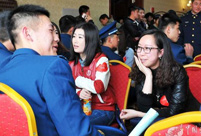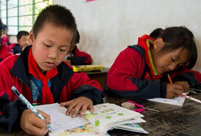 'Model husband' shatters image of love
'Model husband' shatters image of love
 Can animals smile? Or put on a happy face
Can animals smile? Or put on a happy face
 Geng Xuan crowned at 9th China Super Model Contest
Geng Xuan crowned at 9th China Super Model Contest
 Top 10 billionaires in the liquor industry
Top 10 billionaires in the liquor industry
 Backstage at China Fashion Week
Backstage at China Fashion Week
 Ballerinas anywhere but onstage
Ballerinas anywhere but onstage
 Top 10 safest airlines in the world
Top 10 safest airlines in the world
 Posters of 33rd HK Film Awards unveiled
Posters of 33rd HK Film Awards unveiled
 Top 10 most popular instant messaging apps in the world
Top 10 most popular instant messaging apps in the world
 Inspiring shadow images of Chinese army
Inspiring shadow images of Chinese army
<b><font color='#808080'>Highlights</font></b>
? Iran and major world powers are likely to start drafting a final agreement next month.
? "The next round will address all available issues in more detail," Araqchi said.
? Baeidinejad said expert-level talks between Iran and world powers have been useful.
TEHRAN, April 6 -- The Islamic republic and major world powers are likely to start drafting a final agreement over Tehran's nuclear program next month, Press TV quoted a senior Iranian nuclear negotiator as saying on Sunday.
"We hope that in the upcoming talks, we would be able to bring the views closer and narrow the differences regarding major issues, so we could get to the details and start writing the text," Abbas Araqchi was quoted as saying.
Araqchi, also a deputy foreign minister, added that Arak heavy water plant and Iran's uranium enrichment activities, which were subjects of debate in the previous rounds of talks, will be among topics addressed in the next round, according to semi-official Mehr news agency.
"The next round will address all available issues in more detail," he said, adding that other issues not covered in previous rounds will also be discussed.
Araqchi's remarks followed a three-day meeting of nuclear experts from Iran and the P5+1 group, namely Britain, China, France, Russia, the United States plus Germany, which concluded in Vienna on Saturday.
After the talks, head of Iranian negotiation team Hamid Baeidinejad said that "the useful technical talks helped the parties to understand each other's stance better."
In the meantime, Marzieh Afkham, Iran's Foreign Ministry spokeswoman, warned against any "unproductive" remarks by western officials about the ongoing negotiations which might negatively impact the talks.
"Threats against and pressure on the Iranian nation have had no results," Afkham said, adding that "only negotiation based on mutual respect ... and recognition of the absolute rights of the Iranian nation would yield results," according to Press TV on Sunday.
The spokeswoman repeated Tehran's stance that it had the legal right to use peaceful nuclear energy but also was willing to allay any "real and logical concerns."
Iranian Foreign Minister Mohammad-Javad Zarif said Iran was against the proliferation of the weapons of mass destruction, semi- official Fars news agency reported on Sunday.
"Nuclear weapons are not in compliance with the religious tenets and defense doctrine of Iran," Zarif said.
Iran and the P5+1 group held a two-day nuclear meeting in Vienna in March. Both EU Foreign Policy Chief Catherine Ashton and the Iranian foreign minister called the talks "substantive" and " useful."
The West demanded that Iran significantly scale back its nuclear program to ensure its peaceful nature, while Iran wants the West to relieve their sanctions imposed on the country.
Both sides have agreed to reconvene the next round of high- level talks in Vienna on May 7, in which they will continue to discuss tough issues, including Iran's heavy water reactor.
Iran and the six major states struck a six-month interim deal in Geneva last November, according to which Iran will suspend some controversial nuclear activities starting from last January, while Western states will lift some sanctions imposed on Iran.
 Wonderful moment of China's airborne forces
Wonderful moment of China's airborne forces Bai Baihe shoots for fashion magazine
Bai Baihe shoots for fashion magazine Red terraced fields in Dongchuan of Yunnan
Red terraced fields in Dongchuan of Yunnan Jiaju Tibetan Village
Jiaju Tibetan Village Spring dating
Spring dating Confucius institute at UC Davis
Confucius institute at UC Davis Little painted faces at temple fair
Little painted faces at temple fair Top 10 safest airlines in the world
Top 10 safest airlines in the world Foreign students at China-Myanmar border
Foreign students at China-Myanmar border The backstage of the Fashion Week
The backstage of the Fashion Week College students in Han costumes
College students in Han costumes Postgraduate works as waitress
Postgraduate works as waitress Life in a Lahu village in Yunnan
Life in a Lahu village in Yunnan An orphan’s wedding
An orphan’s wedding Hollywood documentary brings Diaoyu Islands truth to new audience
Hollywood documentary brings Diaoyu Islands truth to new audienceDay|Week|Month